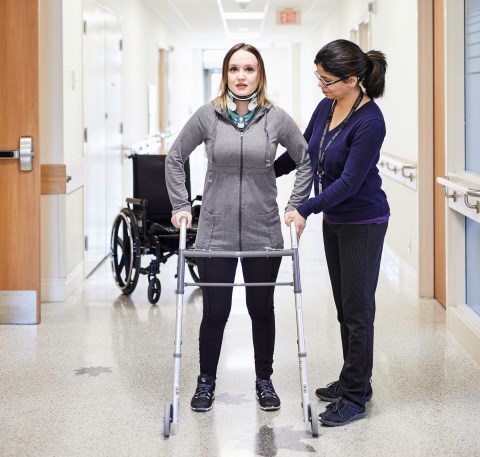In February 2019 Runnymede Healthcare Centre will launch a High Tolerance Short Duration Rehabilitation (HTSD Rehab) program for adults who can benefit from intensive, short-term rehabilitation after injury or surgery.
Patients in West Toronto currently have some of the longest wait times for rehabilitation. By running HTSD Rehab alongside its existing Low Tolerance Long Duration Rehabilitation (LTLD Rehab) and Medically Complex (MC) programs, Runnymede is addressing this growing demand for treatment.
With the new HTSD Rehab program in place at Runnymede, patients in the community will have increased access to treatment, where and when they need it most. “Our goal is to restore physical health and well-being to the greatest possible degree and get patients back to their everyday lives or the next destination in their healthcare journey,” says Connie Dejak, Runnymede’s President and Chief Executive Officer.
The program’s launch enhances Runnymede’s long-standing partnership with Trillium Health Partners (THP) in Mississauga. Patients from THP will have access to 35 of the new HTSD Rehab beds, which in turn will open up acute care bed spaces there and alleviate capacity pressures.
”By offering HTSD Rehab in partnership with Trillium Health Partners we are building on Runnymede’s innovation in care delivery to ensure patients get the care they need closer to home,” says Dejak. “For all of our patients, Runnymede is an essential partner on the road to recovery.”
This expansion to Runnymede’s clinical programs comes just three months after the hospital announced plans to break new ground on a 200-bed long-term care facility. In addition to increasing the community’s access to patient-centred care, the HTSD Rehab program will fundamentally change the face of Runnymede’s patient population.
The pace and scale of change to the healthcare system today is unprecedented, but Runnymede continues to put patients first. With HTSD Rehab in place, the hospital will give patients better access to programs that are in high demand as it continues supporting the wider healthcare system.
Michael Oreskovich is a Communications Specialist at Runnymede Healthcare Centre.


